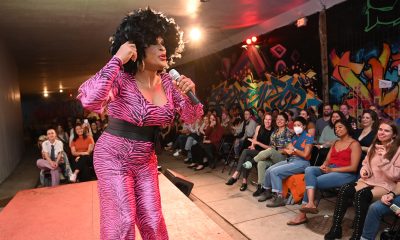Local
Top 10 local stories of 2021
Hate crimes, book bans, and Nellie’s protests
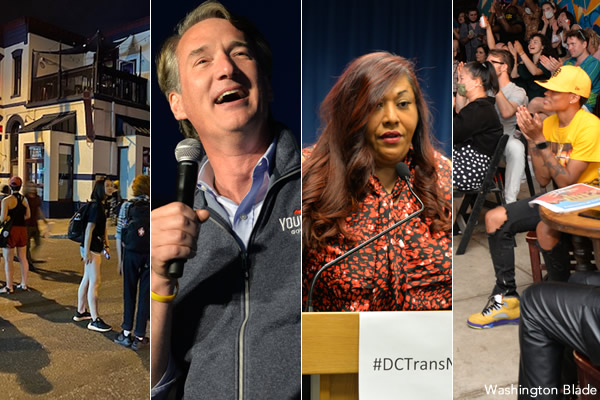
#10: Gay Asian man, parents assaulted in Northwest
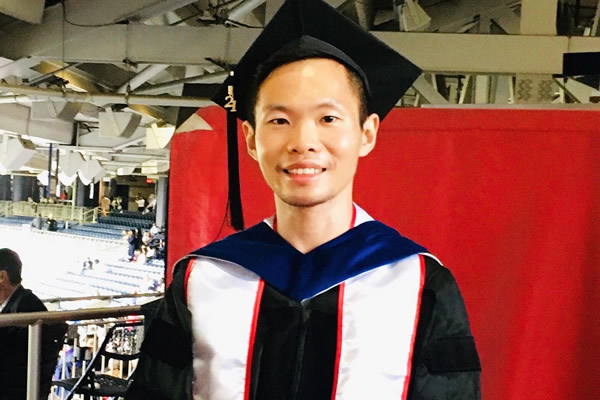
A gay Asian man and his parents were treated and released from a local hospital after they were attacked and assaulted on Aug. 7 on a street near the Washington National Cathedral by a male assailant who shouted homophobic and anti-Asian slurs, according to D.C. police and court records.
Charging documents filed in D.C. Superior Court state that D.C. police, who arrived on the scene a short time after the attack, arrested D.C. resident and American University graduate student Patrick Trebat, 38, on one count of felony assault, two counts of simple assault, and one count of destruction of property. The charging document says Trebat allegedly damaged the cell phone of Sean Lai, 30, an out gay man of Chinese ancestry, as he allegedly punched and kicked Lai and Lai’s elderly parents on the 3700 block of Fulton St., N.W. while shouting the words “faggots” and “You’re not Americans.”
Prosecutors with the U.S. Attorney’s Office changed the charges to two counts of felony assault with significant bodily injury and listed the incident as an anti-Asian bias related crime. American University in October announced Trebat was no longer a student at the school.
#9: D.C., Md, Va. pass laws banning panic defense

The D.C. Council and the Maryland and Virginia General Assemblies each passed their own laws in 2021 banning the use of the so-called LGBTQ panic defense in criminal trials.
LGBTQ rights organizations and legal experts have said attorneys representing defendants charged with committing violent crimes against LGBTQ people, including murder, have used the panic defense to confuse juries into finding them not guilty by arguing that their clients committed an act of violence against an LGBTQ person in a form of self-defense in a state of “panic” after they learned that the victim was an LGBTQ person. Supporters of banning the defense say it improperly places the blame for a violent act on the LGBTQ victim.
D.C. Mayor Muriel Bowser (D) and Virginia Gov. Ralph Northam (D) signed the legislation banning the panic defense after expressing strong support for the measures. Maryland Gov. Larry Hogan (R) declined to sign the Maryland bill but announced he would allow the bill to become law without his signature.
#8: Gay men arrested under Md. sodomy law in bookstore raid

Harford County, Md., Sheriff’s Office deputies arrested four men on a charge of Perverted Sexual Practice under the Maryland sodomy law during a May 20 raid on the Bush River Books & Video store in the town of Abington, located 25 miles north of Baltimore.
Four other men were charged with indecent exposure, and another was charged with solicitation for prostitution for a total of nine arrests during the May 20 raid that was prompted by complaints from nearby residents, according to a statement released by the Sheriff’s Office.
An attorney with the LGBTQ litigation group Lambda Legal said the sodomy arrests appeared to be a violation of the U.S. Supreme Court’s 2003 ruling declaring state sodomy laws unconstitutional. Lambda attorney Greg Nevins said that although the Supreme Court ruling does not cover acts of sodomy committed in public places, the men arrested in the May 20 raid engaged in alleged consenting sexual acts in a locked video booth, which Sheriff’s deputies unlocked after obtaining keys from a bookstore employee. He said it would be up to a judge to decide whether the video booths could be considered a private space as argued by attorneys representing the arrested men, who were released while awaiting court appearances.
The bookstore raid, meanwhile, drew attention to a little noticed development that the Maryland General Assembly in 2020 repealed only one of Maryland’s two antiquated sodomy statutes, the one outlawing anal sex. At the request of conservative Republican lawmakers, the General Assembly left in place Maryland’s Unnatural or Perverted Sexual Practice Act, which outlaws oral sex. LGBTQ supportive Maryland House of Delegates Member David Moon (D-Montgomery County) said he plans to introduce a bill in 2022 to repeal that statute.
#7: Loudoun County schools’ trans nondiscrimination policy under fire
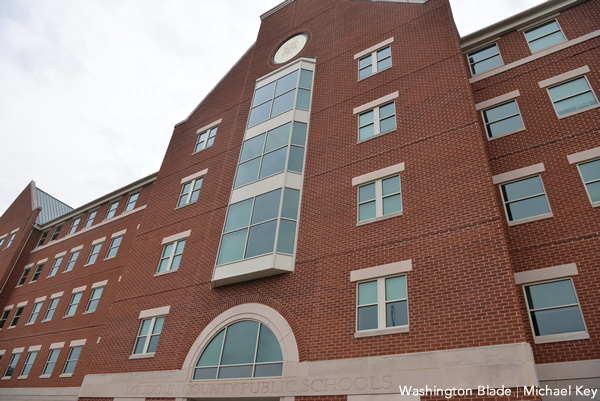
The Loudoun County, Va., public school system’s policy of allowing students to use the bathroom or locker room that matches their gender identity came under fire in October after news surfaced that a 15-year-old “gender fluid” boy allegedly sexually assaulted two girls in different high schools.
Law enforcement officials said one of the assaults allegedly occurred on May 28 in the girl’s bathroom at Stone Bridge High School in Ashburn, Va., while the boy was dressed in a skirt. The other assault allegedly occurred on Oct. 6 in a vacant classroom at Broad Run High School, also in Ashburn, after the boy was transferred there while facing charges for the first assault.
“The sexual assault on our daughter and the subsequent sexual assault by the same individual were both predictable and preventable,” the parents of the girl involved in the first alleged assault said in a statement released by their attorney. “Subsequent to the sexual assault on our daughter, Loudoun County Public Schools formalized the policy regarding restroom use that was easily exploitable by a potential sexual assailant,” the parents’ statement says.
The LGBTQ advocacy group Equality Loudoun released its own statement saying sexual assault cases should be prosecuted to the fullest extent of the law regardless of the sexual orientation or gender identity of the perpetrator. However, the group said allegations that the perpetrator of the two school assaults was transgender or genderfluid had not been verified. “Attempts to shift the blame of this incident to any individual, group, or policy – other than the alleged perpetrator – does a grave disservice to the victims of these crimes and already marginalized youth in our community,” the Equality Loudoun statement says.
#6: Supreme Court upholds Va. trans rights ruling
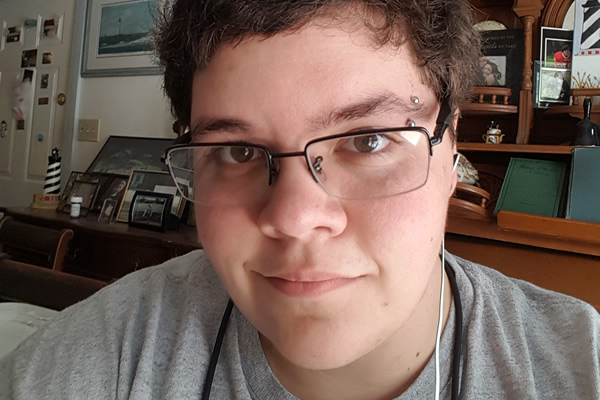
The U.S. Supreme on June 28 refused to hear an appeal by the Gloucester County, Va., School Board challenging a lower court ruling that transgender former high school student Gavin Grimm had a legal right to use the men’s bathroom at his high school. The high court’s decision not to hear the case leaves in place U.S. district court and U.S. appeals court rulings declaring the school board violated federal law and the Equal Protection Clause of the U.S. Constitution by prohibiting Grimm from using the same bathrooms as other boys and forcing him to use separate bathrooms. The ACLU, which represented Grimm in his more than five-year legal battle that continued after his high school graduation, called the development a major victory for the rights of trans students.
Four months after the Supreme Court’s action, the Gloucester School Board agreed to settle the case by paying Grimm $1.3 million to cover attorney’s fees that the ACLU says the school board is responsible for.
#5: Casa Ruby shakeup
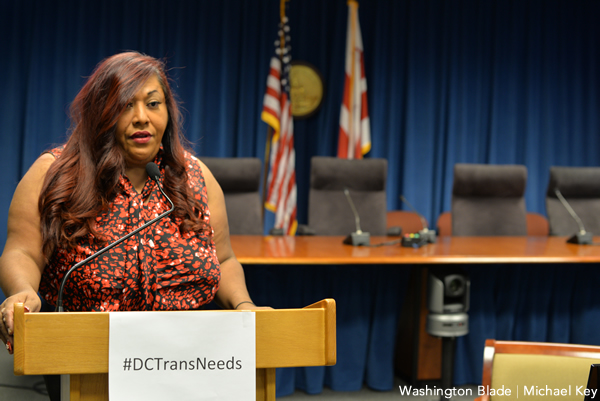
Ruby Corado, the founder and executive director of D.C.’s LGBTQ community services center Casa Ruby, announced in a Facebook live broadcast in October that she had resigned from her executive director’s position. Corado stated in her broadcast that her resignation was in response to an ongoing dispute with the D.C. government that resulted in a decision by the city one week earlier to discontinue an $850,000 annual city grant to fund Casa Ruby’s emergency low barrier shelter for homeless LGBTQ youth and adults.
Corado called the decision by the D.C. Department of Human Services not to renew the grant for fiscal year 2022 an act of retaliation based, in part, on what she says was her refusal to agree to a request by the city agency to move the Casa Ruby shelter to a neighborhood unsafe for trans women and LGBTQ youth. The DHS has declined to disclose its reason for ending the grant, saying only that it has arranged for other LGBTQ supportive organizations to carry out LGBTQ-related homeless services.
Longtime D.C. transgender rights advocate Alexis Blackmon, who had been serving as Casa Ruby’s Government Affairs Director, was named the organization’s interim executive director. Corado said that, following a six-month sabbatical, she plans to organize fundraising efforts to support Casa Ruby’s programs independent of D.C. government funding.
#4: GOP victories in Va. could endanger LGBTQ rights
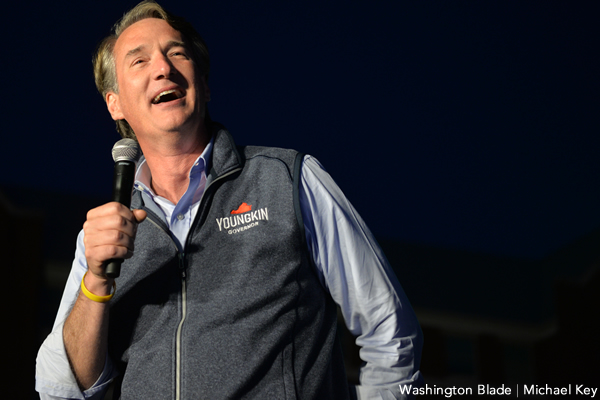
The close but decisive wins in the November election in Virginia by Republicans Glenn Youngkin as governor, Winsome Sears as lieutenant governor, and Jason Miyares as attorney general and Republicans winning control of the Virginia House of Delegates raises questions about whether the recent sweeping advances in LGBTQ rights in Virginia put in place by the outgoing Democratic Gov. Ralph Northam, and the Democratic-controlled General Assembly could be in jeopardy.
Youngkin, who defeated Democratic candidate and former Virginia Gov. Terry McAulliffe, expressed opposition to nondiscrimination protections enacted by the Democratic-controlled General Assembly in 2020 for transgender and nonbinary students in the state’s public schools. He has also expressed opposition to same-sex marriage while saying he would not likely take steps to repeal the legal standing of marriage equality.
But of greatest concern among Virginia’s LGBTQ activists is Attorney General-elect Miyares’s voting record on LGBTQ issues in his role as a member of the state’s House of Delegates from the Virginia Beach area since 2016. Since Democrats took control of the legislature in January 2020, Miyares has voted against nearly all of the LGBTQ supportive bills passed during that time, including bills adding LGBTQ people to the state’s anti-discrimination law, adding LGBTQ people to the state’s hate crimes law, banning the use of the so-called LGBTQ panic defense in criminal trials, restricting the use of conversion therapy for minors, and repealing the state’s longstanding but unenforceable statute banning same-sex marriage.
With Democrats retaining control of the Virginia Senate, Republican elected officials hostile to LGBTQ rights cannot — without the unlikely defection of Democratic lawmakers — repeal these and other LGBTQ supportive laws in the state. But activists have expressed concern that, as attorney general, Miyares might be in a position to curtail the enforcement of the LGBTQ supportive laws.
Among the few positive outcomes of the Virginia election, according to LGBTQ activists, was that the three openly LGBTQ members of the House of Delegates, each of whom are Democrats, won re-election, including Danica Roem of Manassas, who is the first openly trans person to be seated in any state legislature in the U.S.
#3: LGBTQ books removed, reinstated in Fairfax schools

The Fairfax County, Va., Public Schools announced in November that it had returned two LGBTQ-themed books to the libraries of the school system’s high schools after temporarily removing the books in response to objections from some parents who claimed they included sexually explicit content inappropriate for students.
The two books, “Lawn Boy,” a novel by author Jonathan Evison, and “Gender Queer: A Memoir,” an autobiography by non-binary author Maia Kobabe, were deemed to be important works of literature suitable to young adults following a thorough review by two school system committees, according to an announcement by Fairfax Public Schools officials. The officials said that although the books include descriptions of sexual acts, they do not constitute pornography and do not promote pedophilia as claimed by some parents and others opposing the books.
The decision to reinstate the books “reaffirms Fairfax Public Schools’ ongoing commitment to provide diverse reading materials that reflect our student population, allowing every child an opportunity to see themselves reflected in literary characters,” a statement by school officials says.
News of the controversy surrounding the two books in the Fairfax County school libraries triggered efforts by conservative groups to ban LGBTQ-themed books in other school districts throughout the country.
#2: D.C. LGBTQ bars and events rebound as COVID restrictions eased
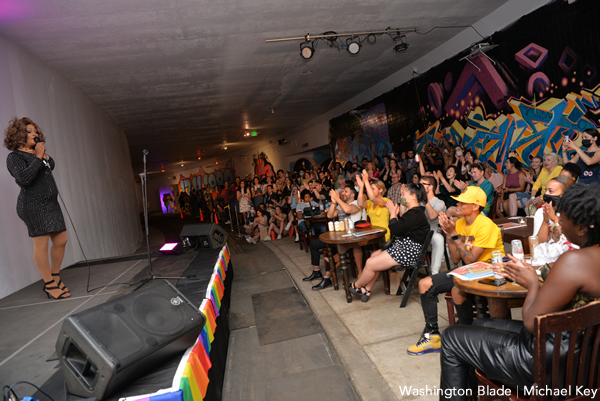
Owners of the city’s gay bars and LGBTQ friendly bars and restaurants joined nightlife businesses across the city in rejoicing over D.C. Mayor Muriel Bowser’s announcement in May that restaurants and bars could resume operations at full capacity and return to pre-pandemic operating hours on May 21.
The mayor’s announcement followed what nightlife businesses said was severe financial hardship caused by the earlier full business shutdowns due to COVID public health restrictions followed by a partial reopening with strict limits of only 25 percent of the normal number of customers inside bars and restaurants and a ban on standing in bars or sitting at bar stools.
The lifting of the bar, restaurant and other nightlife business restrictions in May was followed by the city’s decision to lift all restrictions on indoor and outdoor events on June 11. That cleared the way for D.C.’s Capital Pride Alliance to organize several scaled back LGBTQ Pride events, including a June 12 Pride Walk, which began at Dupont Circle and traveled to Freedom Plaza, where a rally was held. The Walk drew widespread attention when U.S. Vice President Kamala Harris and her husband joined the walk as it approached Freedom Plaza.
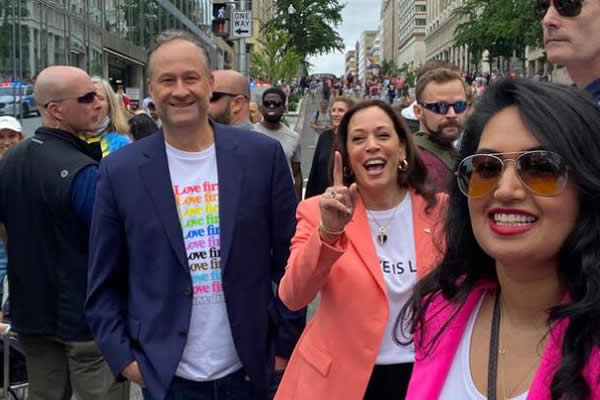
The enthusiasm over the full reopening of LGBTQ nightlife venues, especially the bars, became evident with long lines of patrons waiting to get into some of the bars that were filled to capacity.
#1: Nellie’s hit with protests after Black woman dragged down stairs
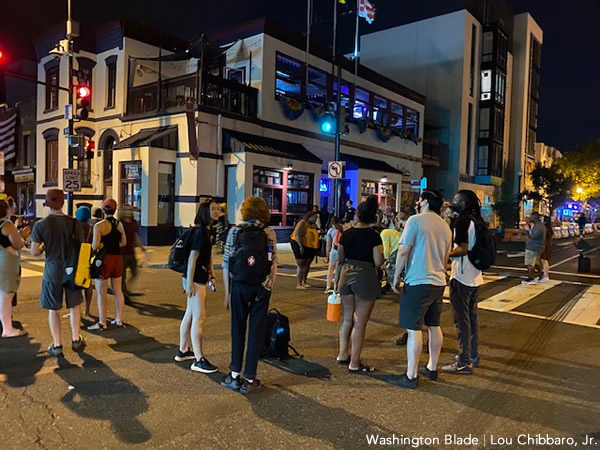
A June 13 incident in which a black woman was dragged down a flight of stairs by a security guard during a brawl that broke out at the D.C. gay bar Nellie’s Sports Bar led to a boycott and months of protests against the bar, an investigation into the incident by the city’s liquor board, and charges by some LGBTQ activists that Nellie’s and other D.C. gay bars had racially biased policies and practices.
The action by the security guard was captured on video taken by one of the customers on their phone that went viral on social media, prompting LGBTQ activists and Black Lives Matter organizers to demand that Nellie’s take appropriate action to review its security procedures. Nellie’s issued an apology for the incident the following day and announced it had fired the private security company whose employee, who is Black, dragged college student Keisha Young, 22, down the stairs. Nellie’s also announced it would temporarily close for business to assess what happened and develop plans to reopen as a safer space for all members of the community.
After two months of staging Friday night protests outside Nellie’s from June through most of August, protest leaders announced at a community meeting that they would discontinue the protests but continue to ask the community to boycott Nellie’s.
Nellie’s reopened 35 days after its self-imposed closing. But on Oct. 20, the D.C. Alcoholic Beverage Control Board, following an investigation into the June 13 incident, approved a compromise agreement with Nellie’s that called for Nellie’s to pay a $5,000 fine and serve a seven-day license suspension for violations that liquor board investigations found had occurred in Nellie’s handling of the fight on its premises that led to Young being dragged down the stairs.
An order issued by the ABC Board said the license suspension would take place from Dec. 20-26 of this year.
District of Columbia
Catching up with the asexuals and aromantics of D.C.
Exploring identity and finding community

There was enough commotion in the sky at the Blossom Kite Festival that bees might have been pollinating the Washington Monument. I despaired of quickly finding the Asexuals and Aromantics of the Mid-Atlantic—I couldn’t make out a single asexual flag among the kites up above. I thought to myself that if it had been the Homosexuals of the Mid-Atlantic I would’ve had my gaydar to rely on. Was there even such a thing as ace-dar?
As it turned out, the asexual kite the group had meant to fly was a little too pesky to pilot. “Have you ever used a stunt kite?” Bonnie, the event organizer asked me. “I bought one. It looked really cool. But I can’t make it work.” She sighed. “I can’t get the thing six feet off the ground.” The group hardly seemed to care. There was caramel popcorn and cookies, board games and head massages, a game of charades with more than its fair share of Pokémon. The kites up above might as well have been a coincidental sideshow. Nearly two dozen folks filtered in and out of the picnic throughout the course of the day.
But I counted myself lucky that Bonnie picked me out of the crowd. If there’s such a thing as ace-dar, it eludes asexuals too. The online forum for all matters asexual, AVEN, or the Asexual Visibility and Education Network, is filled with laments: “I don’t think it’s possible.” “Dude, I wish I had an ace-dar.” “If it exists, I don’t have it.” “I think this is just like a broken clock is right twice a day type thing.” What seems to be a more common experience is meeting someone you just click with—only to find out later that they’re asexual. A few of the folks I met described how close childhood friends of theirs likewise came out in adulthood, a phenomenon that will be familiar to many queer people. But it is all the more astounding for asexuals to find each other this way, given that asexual people constitute 1.7% of sexual minorities in America, and so merely .1% of the population at large.
To help other asexuals identify you out in the world, some folks wear a black ring on their middle finger, much as an earring on the right ear used to signify homosexuality in a less welcoming era. The only problem? The swinger community—with its definite non-asexuality—has also adopted the signal. “It’s still a thing,” said Emily Karp. “So some people wear their ace rings just to the ace meet-ups.” Karp has been the primary coordinator for the Asexuals and Aromantics of the Mid-Atlantic (AAMA) since 2021, and a member of the meet-up for a decade. She clicked with the group immediately. After showing up for a Fourth of July potluck in the mid-afternoon, she ended up staying past midnight. “We played Cards against Humanity, which was a very, very fun thing to do. It’s funny in a way that’s different than if we were playing with people that weren’t ace. Some of the cards are implying, like, the person would be motivated by sex in a way that’s absurd, because we know they aren’t.”
Where so many social organizations withered during the pandemic, the AAMA flourished. Today, it boasts almost 2,000 members on meetup.com. Karp hypothesized that all the social isolation gave people copious time to reflect on themselves, and that the ease of meeting up online made it convenient as a way for people to explore their sexual identity and find community. Online events continue to make up about a third of the group’s meet-ups. The format allows people to participate who live farther out from D.C. And it allows people to participate at their preferred level of comfort: while many people participate much as they would at an in-person event, some prefer to watch anonymously, video feed off. Others prefer to participate in the chat box, though not in spoken conversation.
A recent online event was organized for a discussion of Rhaina Cohen’s book, “The Other Significant Others,” published in February. Cohen’s book discusses friendship as an alternative model for “significant others,” apart from the romantic model that is presupposed to be both the center and goal of people’s lives. The AAMA group received the book with enthusiasm. “It literally re-wired my brain,” as one person put it. People discussed the importance of friendship to their lives, and their difficulties in a world that de-prioritized friendship. “I can break up with a friend over text, and we don’t owe each other a conversation,” one said. But there was some disagreement when it came to the book’s discussion of romantic relationships. “It relegates ace relationships to the ‘friend’ or ‘platonic’ category, to the normie-reader,” one person wrote in the chat. “Our whole ace point is that we can have equivalent life relationships to allo people, simply without sex.” (“Allo” is shorthand for allosexual or alloromantic, people who do experience sexual or romantic attraction.)
The folks of the AAMA do not share a consensus on the importance of romantic relationships to their lives. Some asexuals identify as aromantic, some don’t. And some aromantics don’t identify as asexual, either. The “Aromantic” in the title of the group is a relatively recent addition. In 2017, the group underwent a number of big changes. The group was marching for the first time in D.C. Pride, participating in the LGBTQ Creating Change conference, and developing a separate advocacy and activism arm. Moreover, the group had become large enough that discussions were opened up into forming separate chapters for D.C., Central Virginia, and Baltimore. During those discussions, the group leadership realized that aromantic people who also identified as allosexual didn’t really have a space to call their own. “We were thinking it would be good to probably change the name of the Meetup group,” Emily said. “But we were not 100% sure. Because [there were] like 1,000 people in the group, and they’re all aces, and it’s like, ‘Do you really want to add a non-ace person?’” The group leadership decided to err on the side of inclusion. “You know, being less gatekeep-y was better. It gave them a place to go — because there was nowhere else to go.”
The DC LGBT Center now sponsors a support group for both asexuals and aromantics, but it was formed just a short while ago, in 2022. The founder of the group originally sought out the center’s bisexual support group, since they didn’t have any resources for ace folks. “The organizer said, you know what, why don’t we just start an ace/aro group? Like, why don’t we just do it?” He laughed. “I was impressed with the turnout, the first call. It’s almost like we tapped into, like, a dam. You poke a hole in the dam, and the water just rushes out.” The group has a great deal of overlap with the AAMA, but it is often a person’s first point of contact with the asexual and aromantic community in D.C., especially since the group focuses on exploring what it means to be asexual. Someone new shows up at almost every meeting. “And I’m so grateful that I did,” one member said. “I kind of showed up and just trauma dumped, and everyone was really supportive.”
Since the ace and aro community is so small, even within the broader queer community, ace and aro folks often go unrecognized. To the chagrin of many, the White House will write up fact sheets about the LGBTQI+ community, which is odd, given that when the “I” is added to the acronym, the “A” is usually added too. OKCupid has 22 genders and 12 orientations on its dating website, but “aromantic” is not one of them — presumably because aromantic people don’t want anything out of dating. And since asexuality and aromanticism are defined by the absence of things, it can seem to others like ace and aro people are ‘missing something.’ One member of the LGBT center support group had an interesting response. “The space is filled by… whatever else!” they said. “We’re not doing a relationship ‘without that thing.’ We’re doing a full scale relationship — as it makes sense to us.”
CJ Higgins is a postdoctoral fellow with the Alexander Grass Humanities Institute at Johns Hopkins University.
District of Columbia
Bowser budget proposal calls for $5.25 million for 2025 World Pride
AIDS office among agencies facing cuts due to revenue shortfall

D.C. Mayor Muriel Bowser’s proposed fiscal year 2025 budget includes a request for $5.25 million in funding to support the June 2025 World Pride celebration, which D.C. will host, and which is expected to bring three million or more visitors to the city.
The mayor’s proposed budget, which she presented to the D.C. Council for approval earlier this month, also calls for a 7.6 percent increase in funding for the Mayor’s Office of LGBTQ Affairs, which amounts to an increase of $132,000 and would bring the office’s total funding to $1.7 million. The office, among other things, provides grants to local organizations that provide services to the LGBTQ community.
Among the other LGBTQ-related funding requests in the mayor’s proposed budget is a call to continue the annual funding of $600,000 to provide workforce development services for transgender and gender non-conforming city residents “experiencing homelessness and housing instability.” The budget proposal also calls for a separate allocation of $600,000 in new funding to support a new Advanced Technical Center at the Whitman-Walker Health’s Max Robinson Center in Ward 8.
Among the city agencies facing funding cuts under the mayor’s proposed budget is the HIV/AIDS, Hepatitis, Sexually Transmitted Disease, and Tuberculosis Administration, known as HAHSTA, which is an arm of the D.C. Department of Health. LGBTQ and AIDS activists have said HAHSTA plays an important role in the city’s HIV prevention and support services. Observers familiar with the agency have said it recently lost federal funding, which the city would have to decide whether to replace.
“We weren’t able to cover the loss of federal funds for HAHSTA with local funds,” Japer Bowles, director of the Mayor’s Office of LGBTQ Affairs, told the Washington Blade. “But we are working with partners to identify resources to fill those funding gaps,” Bowles said.
The total proposed budget of $21 billion that Bowser submitted to the D.C. Council includes about $500 million in proposed cuts in various city programs that the mayor said was needed to offset a projected $700 million loss in revenue due, among other things, to an end in pandemic era federal funding and commercial office vacancies also brought about by the post pandemic commercial property and office changes.
Bowser’s budget proposal also includes some tax increases limited to sales and business-related taxes, including an additional fee on hotel bookings to offset the expected revenue losses. The mayor said she chose not to propose an increase in income tax or property taxes.
Earlier this year, the D.C. LGBTQ+ Budget Coalition, which consists of several local LGBTQ advocacy organizations, submitted its own fiscal year 2025 budget proposal to both Bowser and the D.C. Council. In a 14-page letter the coalition outlined in detail a wide range of funding proposals, including housing support for LGBTQ youth and LGBTQ seniors; support for LGBTQ youth homeless services; workforce and employment services for transgender and gender non-conforming residents; and harm reduction centers to address the rise in drug overdose deaths.
Another one of the coalition’s proposals is $1.5 million in city funding for the completion of the D.C. Center for the LGBTQ Community’s new building, a former warehouse building in the city’s Shaw neighborhood that is undergoing a build out and renovation to accommodate the LGBTQ Center’s plans to move in later this year. The coalition’s budget proposal also calls for an additional $300,000 in “recurring” city funding for the LGBTQ Center in subsequent years “to support ongoing operational costs and programmatic initiatives.”
Bowles noted that Bowser authorized and approved a $1 million grant for the LGBTQ Center’s new building last year but was unable to provide additional funding requested by the budget coalition for the LGBTQ Center for fiscal year 2025.
“We’re still in this with them,” Bowles said. “We’re still looking and working with them to identify funding.”
The total amount of funding that the LGBTQ+ Budget Coalition listed in its letter to the mayor and Council associated with its requests for specific LGBTQ programs comes to $43.1 million.
Heidi Ellis, who serves as coordinator of the coalition, said the coalition succeeded in getting some of its proposals included in the mayor’s budget but couldn’t immediately provide specific amounts.
“There are a couple of areas I would argue we had wins,” Ellis told the Blade. “We were able to maintain funding across different housing services, specifically around youth services that affect folks like SMYAL and Wanda Alston.” She was referring to the LGBTQ youth services group SMYAL and the LGBTQ organization Wanda Alston Foundation, which provides housing for homeless LGBTQ youth.
“We were also able to secure funding for the transgender, gender non-conforming workforce program,” she said. “We also had funding for migrant services that we’ve been advocating for and some wins on language access,” said Ellis, referring to programs assisting LGBTQ people and others who are immigrants and aren’t fluent in speaking English.
Ellis said that although the coalition’s letter sent to the mayor and Council had funding proposals that totaled $43.1 million, she said the coalition used those numbers as examples for programs and policies that it believes would be highly beneficial to those in the LGBTQ community in need.
“I would say to distill it down to just we ask for $43 million or whatever, that’s not an accurate picture of what we’re asking for,” she said. “We’re asking for major investments around a few areas – housing, healthcare, language access. And for capital investments to make sure the D.C. Center can open,” she said. “It’s not like a narrative about the dollar amounts. It’s more like where we’re trying to go.”
The Blade couldn’t’ immediately determine how much of the coalition’s funding proposals are included in the Bowser budget. The mayor’s press secretary, Daniel Gleick, told the Blade in an email that those funding levels may not have been determined by city agencies.
“As for specific funding levels for programs that may impact the LGBTQ community, such as individual health programs through the Department of Health, it is too soon in the budget process to determine potential adjustments on individual programs run though city agencies,” Gleick said.
But Bowles said several of the programs funded in the mayor’s budget proposal that are not LGBTQ specific will be supportive of LGBTQ programs. Among them, he said, is the budget’s proposal for an increase of $350,000 in funding for senior villages operated by local nonprofit organizations that help support seniors. Asked if that type of program could help LGBTQ seniors, Bowles said, “Absolutely – that’s definitely a vehicle for LGBTQ senior services.”
He said among the programs the increased funding for the mayor’s LGBTQ Affairs office will support is its ongoing cultural competency training for D.C. government employees. He said he and other office staff members conduct the trainings about LGBTQ-related issues at city departments and agencies.
Bowser herself suggested during an April 19 press conference that local businesses, including LGBTQ businesses and organizations, could benefit from a newly launched city “Pop-Up Permit Program” that greatly shortens the time it takes to open a business in vacant storefront buildings in the downtown area.
Bowser and Nina Albert, D.C. Deputy Mayor for Planning and Economic Development, suggested the new expedited city program for approving permits to open shops and small businesses in vacant storefront spaces could come into play next year when D.C. hosts World Pride, one of the word’s largest LGBTQ events.
“While we know that all special events are important, there is an especially big one coming to Washington, D.C. next year,” Bowser said at the press conference. “And to that point, we proposed a $5.25 million investment to support World Pride 2025,” she said, adding, “It’s going to be pretty great. And so, we’re already thinking about how we can include D.C. entrepreneurs, how we’re going to include artists, how we’re going to celebrate across all eight wards of our city as well,” she said.
Among those attending the press conference were officials of D.C.’s Capital Pride Alliance, which will play a lead role in organizing World Pride 2025 events.
Maryland
Health care for Marylanders with HIV is facing huge cuts this summer
Providers poised to lose three-quarters of funding

BY MEREDITH COHN | By the end of June, health care providers in Maryland will lose nearly three-quarters of the funding they use to find and treat thousands of people with HIV.
Advocates and providers say they had been warned there would be less money by the Maryland Department of Health, but were stunned at the size of the drop — from about $17.9 million this fiscal year to $5.3 million the next. The deep cuts are less than three months away.
The rest of this article can be read on the Baltimore Banner’s website.
-

 State Department4 days ago
State Department4 days agoState Department releases annual human rights report
-

 District of Columbia2 days ago
District of Columbia2 days agoCatching up with the asexuals and aromantics of D.C.
-

 South America2 days ago
South America2 days agoArgentina government dismisses transgender public sector employees
-

 Politics5 days ago
Politics5 days agoSmithsonian staff concerned about future of LGBTQ programming amid GOP scrutiny





